Vandals of the end of the XXth century, by Ermolay K. Adzhindzhal
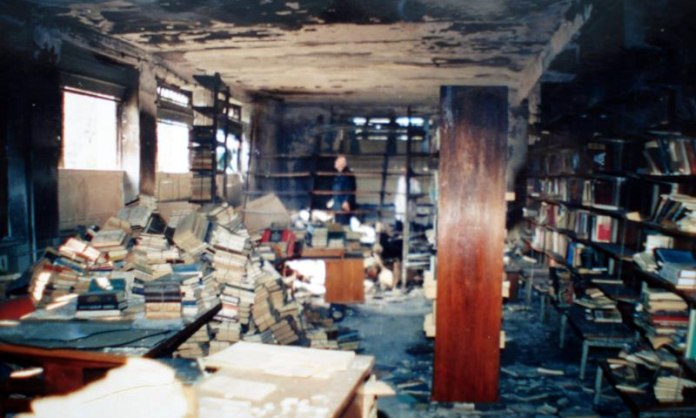
I.G. Papaskir National Library of the Republic of Abkhazia. Boris Cholaria, library director.
During the Soviet period Abkhazia was a communist colony of a unitary Georgia. The colonial regime of the Georgian metropolis in Abkhazia was different from all other forms of totalitarian structures, since here the colonial policy was directed only against ethnic Abkhazians. In the 1930s the most educated and conscious representatives of the Abkhazian nation were executed, the Abkhazian script was replaced by the Georgian one, teaching at Abkhazian schools was changed into the Georgian language, and it was strictly forbidden to teach Abkhazian history at schools. All Abkhazian toponyms were totally georgianized. Abkhazian history was falsified and artificially ascribed to Georgian history. Abkhazian names underwent total georgianization. But what is more important, a great number of Georgians, mostly from western regions and the interior of Georgia, were in an organized way resettled in Abkhazia (through a special body "Abkhazianspereselenstroi" which was created for this purpose). When the whole Soviet country was selflessly fighting against fascism and was putting all its resources into the front, Abkhazia was suffering Georgian colonization. Houses with very comfortable facilities for those days were built for the settlers. Colonization in a more concealed way lasted till 1992. The colonial authorities did everything they could to assimilate the Abkhazians, who consequently became an insignificant minority in their own motherland. By the 1980s the Abkhazians constituted only 17% of the total population of the country.
The Georgian war of aggression against the Abkhazians in 1992-1993 became the apogee of the colonial policy of Georgia in Abkhazia. This war was of a specific character as well. By the beginning of the war because of the systematic assimilation of Abkhazia by the Georgian side the number of Georgians equaled the total number of all other ethnic groups - Abkhazians, Armenians, Russians, Greeks, Jews and others. The Georgian diaspora in Abkhazia as a "Fifth column" succumbed to intensive Nazi propaganda, took up arms (in some cases voluntary, in some - forcibly) and participated in the war, supporting the Georgian occupation forces. These quislings fought against their neighbours, acquaintances, co-workers and compatriots. Therefore civil war in Abkhazia, in which neighbours killed each other, lasted 14 months. Cruel and inhumane behaviour by the Georgian occupation forces is demonstrated by the statement of the Commander in Chief of the Georgian army, Georgi Karkarashvili, that “he is ready to sacrifice the lives of one hundred thousand Georgians in order to destroy all the Abkhazians...”
War is war. It is always accompanied by cruelty, injustice and, of course, crimes. But this war witnessed one event which has no analogues in the history of all wars at all times. At the initiative of the scientists from Tbilisi, the Georgian occupation military and civil leadership in Sukhum without any military necessity, far from the front line and in the centre of the occupied city, committed an unprecedented crime. On 22nd October, 1992, at four p.m. Georgian soldiers simultaneously set two buildings on fire - the Abkhazian State Archive and the Institute of Humanities. In several days both buildings burnt to ashes!!! Since there is no precedent for such a crime in world history I would like to tell the reader in detail how it happened. There were witnesses who saw representatives of the Georgian occupation authorities carrying gasoline cans into the buildings of the State Archive, the State Theatre, The State Museum and the Abkhazian Institute before the 22nd of October in order to commit arson in the future.
However the buildings of the State Theatre and the State Museum were saved at the insistence of two Georgians. One Georgian actor named Jaiani convinced the arsonists that there was no point in burning the theatre building, since only the Georgian actors remained there and that the Abkhazian troupe had escaped to Gudauta and would never come back and so on. The museum building was rescued due to the fact that a Georgian named Akhalaia, who also had influence on the occupation authorities, lived in the apartment building next to the museum. Akhalaia managed to convince the arsonists that in the event of burning the museum building the house he lived in would burn as well. But let us take a look at the arson itself.
After two months of occupation of Sukhum by the Georgian State Council forces, on October 22nd 1992 armed soldiers, high-ranking military officers and civil servants appeared near the buildings of the State Archive and the Institute. At two simultaneous commands the soldiers entered these two buildings and set them on fire. When fire appeared and the smoke went up people began to approach the building and to express their outrage. As a result the soldiers opened fire to disperse the angry crowd. For example, near the Institute building they wounded a staff member of the museum, archeologist Nicolai Shenkao. Eventually the crowd was all dispersed.
Concerning the State Archive Building, the fire was extinguished by the residents of the neighbouring blocks. When the Georgian leadership enquired about this they sent their soldiers to the arson site, and as in the situation at the Institute the soldiers dispersed the crowd with machine gun shots. On the site of the State Archive the soldiers were turning up the ashes with long iron hooks to make sure that no single sheet of archive material was left. The Georgian military performed the shameful task assigned to them by their leadership - for several days two buildings of universal importance were burnt in occupied Sukhum, far from the front line!!!
By the way I would like to note that before the buildings were burnt I had been in Sukhum and had an opportunity to go inside the Institute building. All doors had been broke open and all bookshelves had been fired at. The cartridge cases were scattered on the floor. Empty bottles of wine were scattered all over. The vandals had apparently celebrated the implementation of their barbarian plan. As soon as I managed to cross the Gumista River which represented the frontal line at that time, I wrote an article about this and published it in the local newspaper.
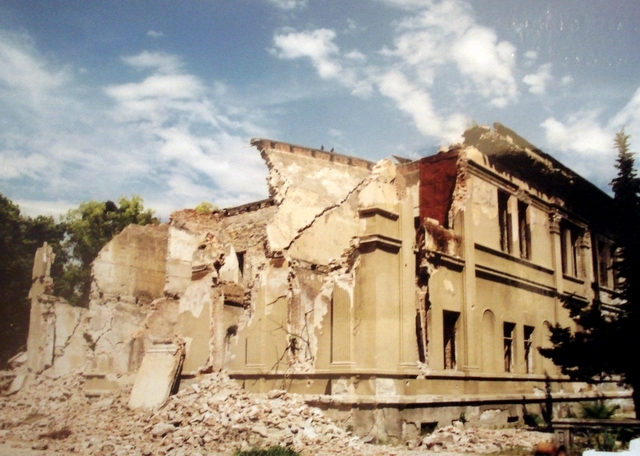
Dmitry Gulia Abkhazian Research Institute of History, Language and Literature
As to the information about this crime, it was all perverted by the Georgian propaganda. Tbilisi ideological machine promptly and cynically informed the whole world that the two building had been burnt by the Abkhazians!!! Two days after this barbarian crime at the meeting of Georgian Parliament, attended by Shevardnadze and foreign guests, Professor Alekseidze reported to the auditorium that "the Abkhazians became so insane, that they not only play football using heads of executed Georgians as balls, but they also burn their own academic institutions, in order to blame Georgians for this". He also added: "Thank God, we reported to the world academic centers, including UNESCO, about this vandalism committed by the Abkhazians".
Firstly, how could they report about this to the world on the third day after the arson, when these buildings, especially the State Archive, were burning three more days?
Secondly, how could the Abkhazians burn their academic institution buildings in Sukhum if no Abkhazians (except for some collaborationists serving the occupants) cold freely move around the city streets and everybody was checked and controlled by the occupation forces. But that is not all. One Russian-language Georgian writer who lived in Moscow and was the editor of the "Druzhba Narodov" (Peoples’ friendship) magazine spread the fable that "the Abkhazians burnt their own academic centers because there were documents proving that the Abkhazians descent from the Georgians". It is difficult to say what is more cynical- such statements or the act of arson of the academic institutions!!!
Unfortunately, very few people outside Abkhazia know about this barbarian crime. People simply refuse to believe in it. The main reason for this is the lie Georgians spread globally about the Abkhazians. It is proved by the case that happened to me in 2002 at the "Separatism and Federalism" section of the Institute of Ethnology of the Russian Federation Academy of Sciences, where I was invited. When it was my turn to deliver my report I said that I represent the Institute which had been burnt by the Georgian occupant during the war on October 22nd, 1992. Many of those present perceived my words as an unfair insult of the Georgian nation. At the request of the director of the Institute V.Tishkov one of the scientists shamed me saying that "You, the Abkhazians, think that we will believe you when you spread such fables. But we know that the Georgians do not burn academic buildings" etc. I found myself in a very embarrassing situation. And then I asked the former scientific associate of our Institute G.P.Lezhava (ethnic Georgian) who at that moment was working at the Institute of the Ethnology "Georgi Platonovich, do you also think that I lie? After all you were working there at that time." He said: "You are right, Ermolay, I tell them the same thing, but they do not believe me." What can be done in this situation? Total deception up to UNESCO had its result. The committed crime had no analogues in the world history. The actions of the Georgian occupants can only be compared to the arson of the Temple of Artemis at Ephesus by Herostratus in 356 BC!
And what an irremediable damage was done to Abkhazia? Millions of pages of unique, having no duplicates historic-informational documents related to the period at least from the time when Abkhazia joined Russia (1810) up to the end of 1970s have been burnt to ashes and are lost forever. These documents covered all spheres of the life of Abkhazia. The Archive contained unique materials not only about Abkhazia, but also about the North Caucasus, Georgia itself, Russia, Turkey and other countries. This vandalism harmed not only historical researchers but also all citizens of Abkhazia, who were not able to certify some facts from their lives. If think about the scientists they were deprived of the opportunity to use archival database and it meant a real catastrophe for them.
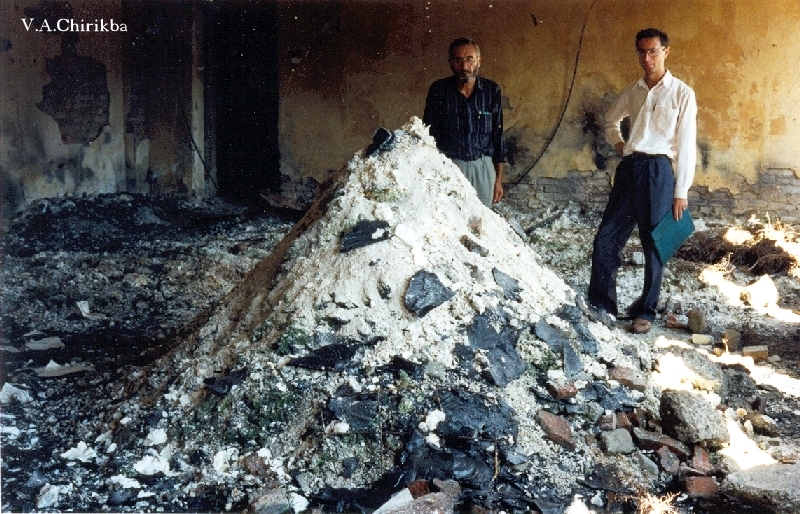
Ermolay Adzhindzhal and Abesalom Lepsaya. Photo by V. A. Chirikba
Before the war I had been researching the history of Christianity in Abkhazia and I had to work at the State Archive of Abkhazia many times. I remember several large rooms which were filled up to ceiling by the huge amount of materials and this was only on the history of religion. And there were so many other materials! In the Abkhazians Institute building there were also many materials on the results of the field expeditions, especially unpublished monographs, articles and collected reports and other works by ethnographers, historians, archeologists and so on. I am outraged by the calm attitude to this event of many academicians, who had worked at the Institute itself, and by the lack of adequate reaction from the intellectuals. They apparently do not fully realize irreparableness and gravity of the consequences of this crime. Because today the Abkhazians are the only nation in the world that has been divested archive. Unfortunately, by this day there have been no investigation of this terrible crime, and what is more, none of our scientists (including the former researchers of the Institute) have written a special article about this! Thank to the western academician Thomas De Waal, who came to Abkhazia to meet with the former director of the State Archive Nicolai Ionidi. After this meeting he wrote and published an article titled "Abkhazia's archive: fire of war, ashes of history".
After the de-occupation of Sukhum I many times came to the site of arson and was looking with tears at the ashes of my own history. I was agonizing over the way to tell the world about this terrible crime. There is a famous painting "The Apotheosis of War" by V.Vereschagin in which a kip of human sculls is depicted. Inspired by this painting I made an ashy kip and brought there a photographer (an officer of the Ministry of the Interior) and we made several snapshots with the researchers of the State Archive. Unfortunately, I have not got the negatives yet. I still have one photo. Unfortunately I do not remember the name of the photographer. I put the ashes of the Archive into small plastic bags with inscriptions "Ashes of the Abkhazians archive, burnt by the Georgian vandals" in Abkhazians, Russian and English and distributed them to different museum. Through Paula Garb and Margery Farrar I sent the bags to the USA. In different newspapers I published articles about the arson of these buildings named "Vandalism", "Khatyn of the Abkhazians Science", "Chauvinism and Vandalism", "On the Genocide of the Abkhazians Nation", "Recognition of Abkhazia and International Law" (Kursk, 2008) and so on. I also wrote about this fact in my book "Abkhazian Reconquista and International Law. My research article on this issue named "On One Aspect of the Informational Blackout" was published in Russian and English in the collection book of the international study group. (Edited by V.Sh.Khagba).
I do not know how different people reacted to this act, but as an Abkhazian I was outraged by this heinous crime to the very roots of my being. I have spoken to many people about this and have repeatedly written that our Prosecutor General's Office must open the criminal case and conduct thorough investigation of this crime. Unfortunately our intellectuals have not reacted to my words and articles. In 2006 I filed a claim to the Attorney-General of the Republic of Abkhazia. The wording of my claim was supported by international legal acts. Particularly I wrote: "Global informational community is the basis of the present civilization. Access to information is a universal right of all people; scientific, political, educational, legal, industrial development is impossible without it. Thus, information and communication technology (ICT) are considered to be the foundation of progress. Moreover, the main program of UNESCO "Information for Everyone", Okinawa Charter and other inter national documents state, that access to information is one of the basic human rights. However, we, the classical scholars of Abkhazia, have been deprived of the right to use archive database on history, culture and the way of life of our country, because our national archive was deliberately burnt by our enemies in 1992. And it is we, Abkhazian scholars, who feel the lack of irreplaceable archival materials, which contained comprehensive information on the ancient and recent history of our nation!" Due to my letter, the criminal case was launched. But after some time the investigation was suspended. After the Tskhinval events in 2008 I addressed the Prosecutor General's Office of the country, with the request to seek help from the Russian Federation in locating, identifying and punishing the criminals. However, the case has seen no progress since then! Though, as I know, the Prosecutor General's Offices of the Republic of Abkhazia and the Russian Federation made an agreement on the possibility of joint investigations of grave crimes. I think that joint Abkhazian-Russian investigation of this crime would benefit Russia as well, since the Georgians now proclaim everywhere, that allegedly "The Russians recognized Abkhazia in order to enslave it!" and so on. And the decision of this court would show to the world the real face of Georgia. In turn it would hasten the recognition of Abkhazia be the international community especially be the UN. The thing is that they have very little official information about the events in Abkhazia. The reason for this is that mendacious global information industry of Georgia still dominates in the cyberspace. Not to mention that Abkhazia is not doing anything in this regard. I would also like to stress that information security is even more important for a country, than economic or any other security of a state.
I think that our intellectuals as well as our government should realize all the gravity of the consequences of this crime for our nation and state. And what is most important this crime should be criminated (desirably by the international court). The period of limitation should not be an obstacle here as this crime was of a universal character. It looks very strange, that this crime has not been condemned yet! It does not make sense, that even person who burns a hen house gets a term, and here the State Archive and the State Research-Scientific Institute were burnt. Therefore I am deeply convinced that this case requires investigation.
In conclusion, I would like once again to call the reader to comprehend what really happened in the occupied Sukhum in October 1992. It was a joint deliberate decision of Georgian historians and officials to set on fire and to turn into ashes in the face of the day the archive of the whole nation. Is such crime acceptable even in one's thoughts? I am afraid that an uninformed leader would ask, whether such crime could happen? Therefore it is necessary to conduct a thorough investigation of this crime. If the fact of crime is confirmed many decision-makers of the international community will know the truth about the Abkhazians-Georgians relations. Moreover, because of the unprecedented and unique nature of this crime October, 22 should be proclaimed the Day of the Genocide of the Abkhazians Science and a memorable "Alley of the Genocide of Science" should be opened at the quay in Sukhum, where the burnt Institute had been situated. And the most important thing is that the decision of the international court should oblige Georgia to return to Abkhazia all the archival materials kept in Tbilisi, Kutaisi, Gelati and other cities. It would help to restore the archive to some extent.
E.K. Adzhindzhal
A scientist of the History Department
of the burnt Abkhazian Institute for Humanitarian Researches
of the Academy of Science of the Republic of Abkhazia.
The Russian version in PDF can be downloaded by clicking here (485 Kb)
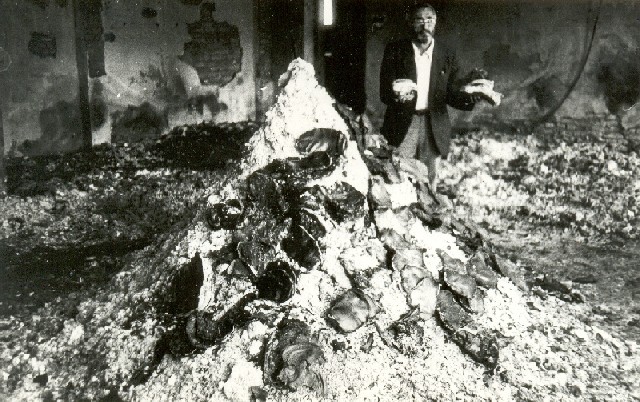
E.K. Adzhindzhal
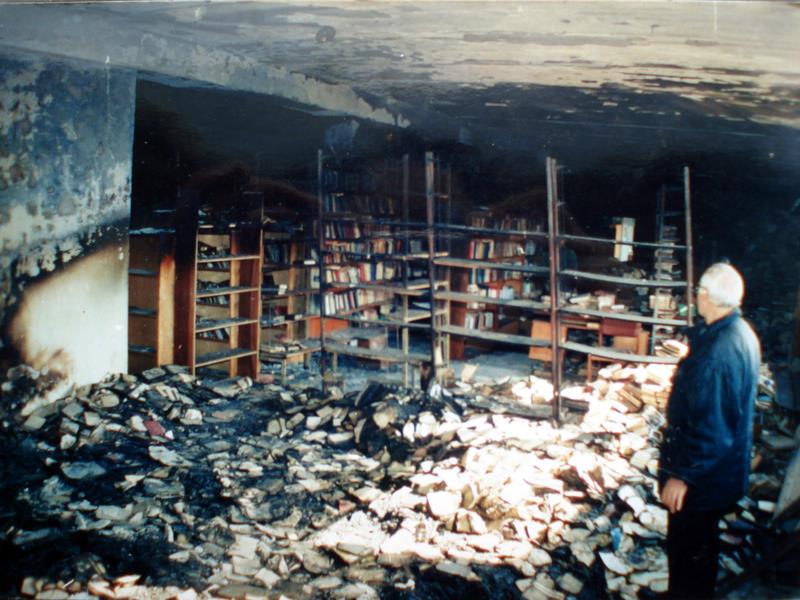
I.G. Papaskir National Library of the Republic of Abkhazia. Boris Cholaria.